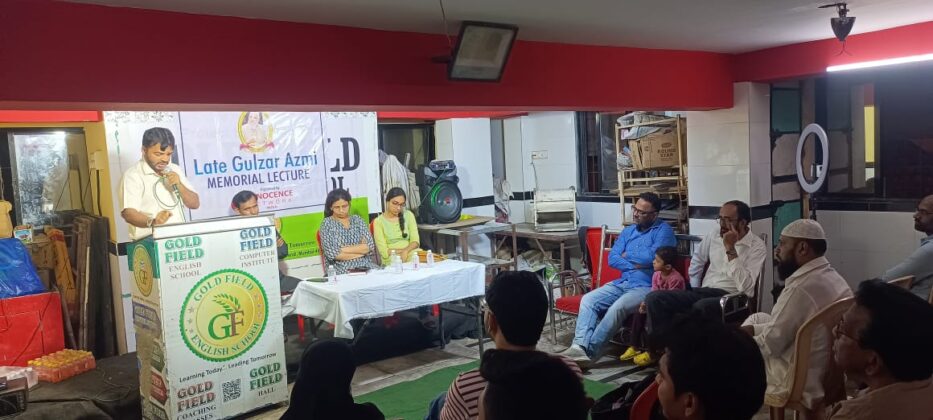The third Late Gulzar Azmi Legal Lecture, titled “Attacks on Muslim Places of Worship by the Judiciary: Causes, Consequences, and Prevention,” was held at the Goldfield English High School in Govandi. Organized by the Innocence Network, the program featured legal experts and activists who criticized the Indian judiciary for allegedly undermining the identity and religious rights of Muslims by ordering surveys of mosques.
Advocate Bhagyashah Kurne, a Bombay High Court lawyer and human rights activist, delivered a pointed critique of the judiciary. She emphasized the significance of the Places of Worship Act, 1991, a law designed to protect the religious status of places of worship as they existed on August 15, 1947. “India has no state religion, so the government must ensure the protection of all places of worship,” she stated. The Act prohibits the conversion of any place of worship, yet recent judicial orders, such as those mandating a survey of the Gyanvapi Mosque, contradict its principles.
Kurne argued that while civil property cases often languish for decades, cases involving claims of temples beneath mosques are fast-tracked, reflecting judicial bias. “This is the first attack on Muslims’ mosques by the judiciary,” she remarked. She also highlighted that similar issues have arisen with Buddhist temples in Ajanta and Ellora. Warning of dire consequences, she said, “Survey orders could lead to riots and deaths. Will the courts take responsibility for such outcomes?”
In her speech, Kurne linked recent violence in Sambhal, where riots erupted around the Shahi Jama Masjid, to judicial orders. She called on the judiciary to consider the real-world implications of its decisions on social harmony and public safety.
Judicial Complicity in Targeting Muslims
Advocate Pritha Paul, another Bombay High Court lawyer and prisoners’ rights activist, framed the issue as an attack on the identity of Muslims. She accused the judiciary of acting in tandem with the government to marginalize the community. “The Constitution guarantees judicial independence, but in practice, this is far from true,” Paul asserted.
Referring to the controversial exclusion of the Babri Masjid from the Places of Worship Act, she described the mosque’s demolition and subsequent land allocation as a “shameful chapter” in Indian judicial history. “The Babri Masjid was a 15th-century mosque. The decision to exclude it from the Act laid the groundwork for further attacks on Muslim places of worship,” she said.
Paul criticized the judiciary for its swift approval of surveys, questioning the purpose behind these orders. “Are they preparing for exams or writing research papers? Why are such orders prioritized when they clearly escalate communal tensions?” she asked.
Paul urged the Muslim community to raise awareness and engage in activism to counter judicial overreach. “We must write, speak, and question these decisions. Silence will only embolden those who seek to undermine us,” she concluded.
Historical and Religious Context
Advocate Wajid Shaikh tackled allegations that Mughal rulers destroyed temples to build mosques, labeling these claims as baseless and historically inaccurate. “If Mughals had destroyed temples en masse, there wouldn’t be a single temple left today,” he argued.
Shaikh also criticized the judiciary for undermining its own precedents. He pointed out that Justice D.Y. Chandrachud, while upholding the Places of Worship Act in the Babri Masjid case, later allowed surveys of mosques, contradicting the Act’s spirit. He accused the judiciary of moral decay, citing the appointments of judges involved in the Babri Masjid case to high-ranking positions as evidence of compromised integrity.
Highlighting Islam’s respect for other religions, Shaikh recalled the Prophet Muhammad’s (PBUH) actions during the conquest of Mecca, where idols were removed from the Kaaba without altering its structure. “Islam has always upheld the sanctity of all places of worship,” he said.
Demands for Justice
The event concluded with five key demands aimed at addressing the ongoing controversies:
1. The Babri Masjid land, handed over to a temple, should be returned to Muslims to correct the judicial error.
2. All petitions claiming temples lie beneath mosques, violating the Places of Worship Act, should be dismissed.
3. Individuals filing such petitions should face three-year prison sentences and fines under Section 6 of the Act.
4. Hindu organizations demanding mosque surveys should be declared threats to national security and banned under the Unlawful Activities (Prevention) Act (UAPA).
5. The judiciary must ensure that its actions do not incite communal violence or violate constitutional rights.
The program began with a Quranic recitation and translation by Maulana Abu Ubaidah, Imam and Khateeb of Darul Falah Mosque, Govandi. Abbas Shaikh outlined the event’s objectives, while Dr. Fareed Shaikh delivered the vote of thanks.
The absence of senior lawyer Mahir Desai due to personal reasons was noted, but his views on judicial accountability were shared by other speakers. The event ended with a prayer, emphasizing the need for unity and vigilance in the face of growing challenges to religious harmony.
This lecture series, dedicated to the memory of Gulzar Azmi, a staunch advocate for justice, serves as a platform for discussing pressing legal and social issues affecting marginalized communities.
